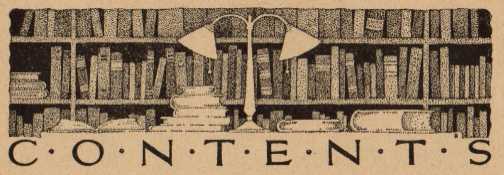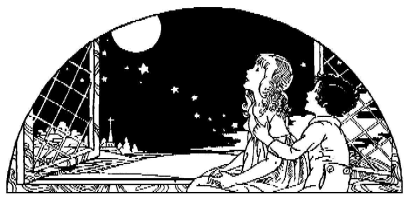Book Collecting
|
The World of Books
is the most remarkable creation of man. Nothing else that he
builds ever lasts. Monuments fall, nations perish, civilizations
grow old and die out and after an era of darkness new races build
others. But in the world of books are volumes that have seen this
happen again and again and yet live on still young, still as
fresh as the day they were written, still telling men's hearts of
the hearts of men centuries dead. |
The Ends of the Earth. I remember to this day being a 10-year-old boy living in a violent world I couldn't understand and whose only sense of peace came from hiding in the local library and getting lost in books. When my weekly allowance finally rose to the grand sum of $1.00 per week, I carefully allocated these funds to finance expeditions to Book Store Row, a group of almost 100 used bookstores that existed at that time on Fourth Avenue between 4th and 14th streets in lower Manhattan. Each Saturday I would take 15 cents to ride the subway from Parkchester in the East Bronx to Astor Place at Fourth Avenue and 8th. I kept 15 cents for my return journey, and I usually reserved 25 cents for a hot dog. That left 45 cents as my entire book purchase budget! But this wasn't such a disaster when you realized that many of the bookstores displayed cheap books in bins right outside the store, with separate bins for 5-cent books, 10-cent books, 25-cent books, etc. In the face of such literary riches, 45 cents seemed a king's ransom. (Even today the cheapest bin is only 48 cents -- or 5 for $2.00.)

At this time my father often took me to the American Museum of Natural History on Sundays because of my fascination with the dinosaur skeletons. On one of these expeditions I learned from reading an exhibit poster that some famous paleontologist had once discovered dinosaur eggs in the Gobi desert. The very next Saturday I visited Book Store Row as usual, and as I started flipping through a book in the 35-cent bin outside the Strand Book Store you can imagine my surprise to find a passage that discussed the discovery of dinosaur eggs in the Gobi desert! I ran home and started reading. It was the very first book for adults that I ever read and it was called "The Ends of the Earth" by Roy Chapman Andrews.
Andrews' claim to fame was the three expeditions he led for the Museum in the 1910's and 1920's to explore Asia, and especially the gigantic Gobi Desert in Central Asia. The first book that came out of this work was "On the Trail of Ancient Man", the second was "The Ends of the Earth", and the last was "This Business of Exploring". (He so-titled the first because Henry Fairfield Osborn, President of the Museum and one of the most overt racists in American history, was determined to prove that man could not have evolved in black Africa but in white Asia.) After Roy attained world fame he became President of the Museum and settled down into the relatively boring life of a corporate administrator raising funds every day.

There's a book for each of you at the public library. (from "The Children's Book on How to Use Books and Libraries" by Carolyn Mott and Leo B. Baisden) |
Andrews is one of those strange writers whose books you don't really need to read in any particular order. That's because he only writes about one thing: how much fun it is to explore the unknown areas of the world. He also has no literary pretensions and writes mostly in one-syllable words, which makes him especially accessible to children. Each book usually has a chapter that tells you about his life up to that point. He did eventually write a biography, and because he lived so long, a separate memoir, but neither of these are as exciting as the early books for the simple reason that they talk a lot about what he did as Museum President, all of which is dull and lifeless.
Remember that Andrews is a product of his times and that, while many of his views are very progressive, he is in no way politically correct. Thus, although the men on his expedition love animals and have lots of pets, they also shoot them for sport. In his book on whaling he is more interested in the pride of the harpooner than the suffering of the whale. Also, the Gobi Desert at that time was as lawless as the American West was 50 years earlier, and deputies like Andrews were expected by the local authorities to -- and often did -- shoot bandits where they stood and leave them for dead.
What excuses all this is the sheer reality of it all. Andrews was a good man in a sometimes terribly beautiful and sometimes terribly dangerous world simply doing the best he could. I doubt you or I, having been raised then, might have done any better. As history, his books are an invaluable record of an area of the world very few of us even today know anything about.
Odd John. When I was thirteen I was beginning to get a very strong suspicion that I was VERY unlike other thirteen-year-olds. I seemed unable to learn the rules of social engagement. I didn't know how to be cruel to animals, I didn't know how to whistle at girls, I didn't know how to care who won the world series. Then I read "Odd John" by Olaf Stapledon, and a whole new theory suggested itself: maybe I was a swan disguised as an ugly duckling.

But it's important to keep your library well-organized! (from "The Children's Book on How to Use Books and Libraries" by Carolyn Mott and Leo B. Baisden) |
I read Odd John again in 1998 and was amazed at how deeply the tragedy of John, who was after all only a human being, still moved me. I'm sure that Stapledon's prescient analysis of early 20th century European politics meant nothing to me in 1959, but thanks to Olaf's heads-up I've been able to live a life of idealism, hope and faith, fully aware that forces of ignorance and immorality can overtake you at any time but not caring because the stakes for all of us are so high -- not unlike the idealism that inspires many people laboring right now to make the world a better place.
I think that science fiction is a critically important literature for young people because it debunks the idea that the values and culture of their parents are the only correct standards for a civilized world. This can even be seen as an overarching theme of almost all science fiction. How many thousands of short stories have been written where an arbitrary cultural prejudice in our society is turned on its head in an alien one? If you think everyone should cut their hair and wear a tie, I'll take you to a planet where criminals who used to have an "A" branded into their foreheads now have to cut their hair and wear a tie. If you think everyone should look like Marilyn Monroe, I'll take you a planet where people who look like Marilyn Monroe are routinely stoned to death. If you think this country is great because we've never lost a war, I'll show you a galactic confederation of planets that has marked Earth as off limits because of our incurable addiction to violence.

"When it is dark enough, men see the stars." -- Ralph Waldo Emerson |
Science fiction rarely falls into the naive pitfalls of politically correct dogma and simplistic utopianism, yet it reliably and joyously undermines the smugness with which Earthlings still cling to their ancestor's mindless superstitions and pointless rituals. Is there any more important lesson for young people to learn if they are ever going to solve the problems we have left them with?